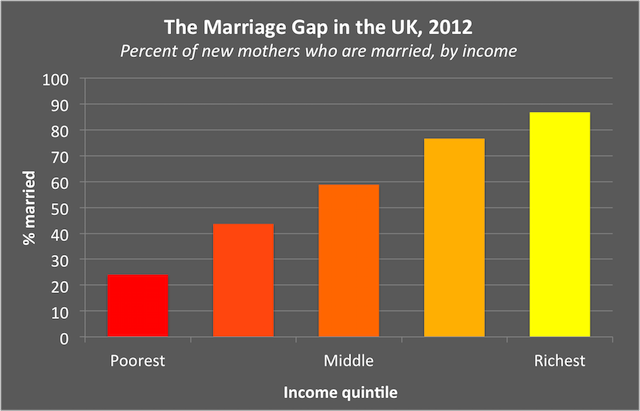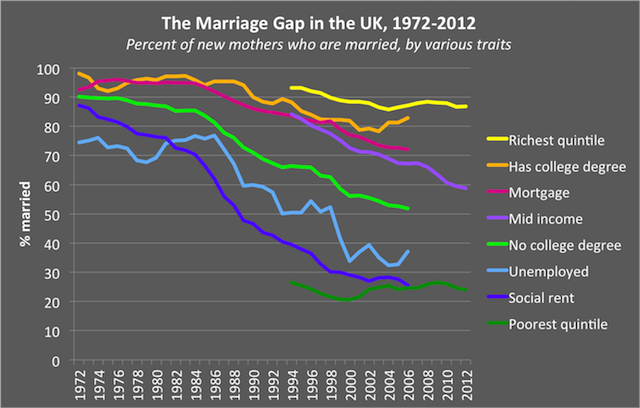Highlights
Does it matter if couples marry or not? For many years now, we’ve had much the same polarized debate on this side of the pond in the UK as you’ve had over in the US.
So every year when the official stats come out about the proportion of births either within or without marriage, there’s a flurry of heated discussions in the media. The current proportion of UK births to married parents sits at a little over half. Those who think that it’s important for couples to be clear about their commitment before having children usually find ourselves pitted against those who think it doesn’t matter and the apparent differences between married and single-parent families are all about poverty or education or something else.
Most prominent among those with a relaxed view of marriage are our policy-makers, those in and around government who influence us most, almost all of whom share the characteristics of having a high education and a high income.
But there’s one other factor that binds our policy-makers together. When they have their own children, almost all of them are married.
If more than half of those better off are marrying, then less than half of those worse off are not. I’ve known this anecdotally for some time. I’d just not appreciated the sheer scale of the marriage gap.
Last month, Marriage Foundation published an in-depth look at which parents of young children are married. With analysis by Professor Stephen McKay of the University of Lincoln, we looked at data going back to the early 1970s using two large government surveys, the General Household Survey and the Family Resources Survey.
Our headline finding was that income, more than any other factor, selects couples into marriage. Whereas only 24 percent of poor parents with children under five (families in the bottom quintile of household income, below £14,000 per year) are married, a remarkable 87 percent of rich parents (those in the top quintile, above £43,000 per year) are married. These proportions have changed little over the past 20 years, which is as far back as we can go with the income data, suggesting that the poor fled marriage during the 1970s and 1980s.

In recent years, those in the middle income group (between £23,000 and £31,000) have begun to follow suit, with the proportion married falling from 84 percent in the mid-1990s to 59 percent today. The U.S. middle classes have been showing similar patterns in recent decades.
Although we couldn’t look back before the 1990s with income, we could with other measures. Of these, the most dramatic change involves housing. Back in 1972, 87% of those with young children and living in social housing (paid for by government) were married. By 2006, the proportion had fallen to 25 percent.
Our analysis details how a marriage gap has opened up between the haves and have-nots. After income (a gap of 63 percentage points between top and bottom), the biggest gaps are across age (57 points), housing status (46 points)—which is ultimately a proxy for income anyway—education (31 points), and employment status (26 points).

I’m not surprised to find a marriage gap between rich and poor. It’s helpful to see it quantified for the first time. But I am surprised that among better-off households with young children—and remember we’re not talking ‘super rich’ here—almost nine out of ten are married. Even this is a conservative figure (understating the proportion of people who are married at the time their children are born) because some of the couples with three- or four-year-olds will already have divorced, more than unmarried parents will have newly married.
As if we needed more evidence that marriage matters, in a previous analysis using Understanding Society data, we found that 24 percent of couples who married before their child was born had split up by their child’s sixteenth birthday, compared to 56 percent of those who married later and 69 percent of those who didn’t marry at all.
Whether through fear of speaking out against the trend, ideological objection, or a dogged determination to believe that other factors are responsible (as it happens, in our couple stability study, we also found that neither age nor education were significant factors in whether couples stayed together), policy-makers continue to disregard the evidence. The result is policies that are ambivalent at best and dismissive at worst on marriage, thus making little or no attempt to turn the rising tide of family breakdown.
The supreme irony is that almost all policy-makers fall into the highest income bracket and almost all of them marry. The poor, those least able to afford the celebrity-style weddings that have become the norm, have listened to their advice and duly abandoned marriage. Yet the rich—those who tell us we don’t need to marry—get married in droves.
It’s a classic case of “do as I say and not as I do.” We need to challenge, and keep challenging, these modern-day Pharisees.
If marriage is so unimportant, why do all of you get married?
Harry Benson is Research Director of the UK-based Marriage Foundation













